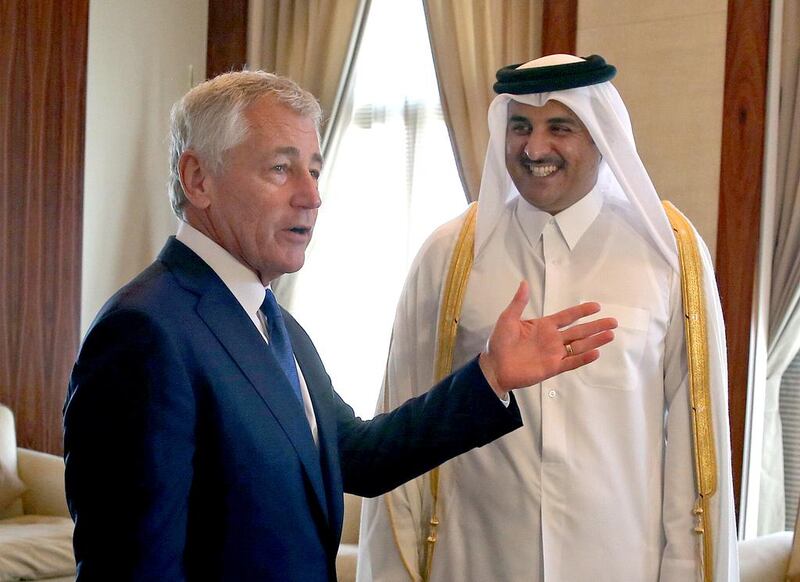DOHA // In the six months since his accession, Qatar’s emir has turned his focus inward, quieting the country’s previously frenetic foreign policy.
In the previous two years, Qatar seemed to announce a new foreign policy drive every week, backing revolutions in Libya and Syria, offering aid to allies in Cairo and Tunis.
As Qatar prepares to celebrate its national day on Wednesday, domestic policy is the focus of the government of Sheikh Tamim bin Hamad bin Khalifa Al Thani.
Still, analysts question whether this is a change of style or substance: Qatar’s policymakers are less outspoken about their aims, but across the region, the country maintains influence and allies.
“One thing that’s clear is that there is a focus now on domestic affairs,” said Khaled Hroub, a professor of Middle Eastern studies at Northwestern University in Qatar.
“The emir is getting the message across to people that it is time to look carefully at our local interests and put them at the top of our agenda. Foreign policy issues, meanwhile, seem to have been downgraded – there is not the same urgency to them.”
The new focus is evident from Doha’s skyline, filled with construction cranes. With an eye toward the football World Cup it will host in 2022, Qatar has broken ground on a new metro system, revamped major roads and put the finishing touches on a new airport set to open in a few months.
All told, the country expects to spend about US$100 billion (Dh367bn) on infrastructure to prepare for the event.
Smaller but equally significant changes are also under way inside the government.
Many expected Sheikh Tamim to shake up the bureaucracy, injecting youth and discipline into the system that employs nine out of 10 Qataris. At the finance ministry, employees now have to log in their hours by fingerprint to monitor punctuality.
“We’ve seen a more disciplined, efficiency-orientated tone from this government in terms of administration,” said a Doha-based analyst. “Work hours are enforced more carefully, for example. So far, the changes are small, but we may see more in the coming year.”
More Qataris are also taking over portfolios of importance within the government.
“Qatar continues to develop human capital. If you look at the ministry of foreign affairs, for example, it is full of young diplomats, female diplomats, diplomats from different backgrounds,” said Reem Al Harmi, a Qatari columnist at Al Raya newspaper. “It’s meritocratic, and if you look at all their resumes, you’ll see their qualifications.”
Meanwhile, some of Qatar’s domestic policies have come under scrutiny from abroad. The labour ministry has promised to follow up on recent reports that workers on World Cup projects were operating in poor conditions.
The government will hire more labour inspectors and undertake site visits to ensure that employers do not withhold passports or wages, two of the most common complaints.
Events in the region may also have contributed to Qatar’s focus inward. Just weeks after Sheikh Tamim took over from his father in June, the pillars of Doha’s regional policy seemed to collapse.
The Egyptian president, Mohammed Morsi, was removed from office, and the new government has since turned down Qatari offers for financial aid. In Syria, an already prolonged conflict has grown more complex and brutal, with little sign that the opposition, which Doha has supported, can win militarily.
Looking closer to home once again, Sheikh Tamim has prioritised the Gulf during his first months in office, taking a regional tour in late October that analysts said was aimed at solidifying ties.
Qatari policymakers maintain that their approach is no different under Sheikh Tamim.
“We have the same policy but it may be that our approach has changed,” Qatar’s foreign minister, Khaled Al Attiya, said at the Chatham House think tank in London last week.
Qataris expect to hear more about that new approach in the coming weeks, and possibly on national day, when Sheikh Tamim is scheduled to speak.
As with any new leader, analysts expect Sheikh Tamim to be both the same and different from his father, who remains extremely popular. Public sightings Sheikh Hamad bin Khalifa Al Thani regularly set social media ablaze with photos.
“The transition was very smooth, such that most people weren’t affected by it at all,” said Shabina Khatri, the editor of the website Doha News.
“The challenge and focus going forward is to get everyone to rally behind the new emir, Sheikh Tamim, and not just around Tamim as the son of his beloved father.”
edickinson@thenational.ae





